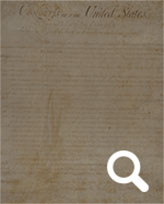Bill of Rights
Bill of Rights
During the debates on the adoption of the Constitution, its opponents repeatedly charged that the document would open the way to tyranny by the strong central government. They demanded a “bill of rights” that would specify the rights of individual citizens.
In September 1789, the First Congress of the United States proposed 12 amendments to the Constitution, addressing the most frequent criticisms. Articles 3 through 12, which three-fourths of the states ratified on December 15, 1791, constitute the first 10 amendments to the Constitution and are known as the Bill of Rights. The original second article, concerning the compensation of members of Congress, finally became law on May 7, 1992. Congress never passed the original first amendment, which concerned the number of constituents for each representative.
The Bill of Rights defines citizens’ rights in relation to the government, including guarantees many Americans now understand as central to their way of life: the four freedoms of speech, religion, the press, and political activity. The Bill of Rights also encompasses principles fundamental to the American legal system: the rights to due process of law, trial by jury, and protection from cruel and unusual punishment and self-incrimination.
The Bill of Rights, along with the Declaration of Independence and the US Constitution, is on display in the Rotunda for the Charters of Freedom in the National Archives Museum in Washington, DC.
Click here to read all 27 ratified amendments to the Constitution.
Past Featured Records
-
The Emancipation Proclamation and Juneteenth
Milestones in the long struggle for American freedom
Emancipation Proclamation
President Abraham Lincoln issued the Emancipation Proclamation on January 1, 1863, as the nation approached the third year of the Civil War. Lincoln’s proclamation, which declared “that all persons held as slaves” within the rebellious states “are, and... Read more
-
Harvey Milk Writes to the President
Friday, May 31, 2024 – Monday, June 17, 2024
East Rotunda GalleryHuman Rights at the Ballot Box
In 1978, Californians voted on Proposition 6, which would have banned gay men and lesbians from teaching or otherwise being employed by California school districts. The initiative sponsored by... Read more -
Memorial Day: Honoring the Fallen
Thursday, May 16, 2024 – Wednesday, June 12, 2024
East Rotunda GalleryMemorial Day recognizes and honors the U.S. military personnel who died while serving in the Armed Forces. The first national observance of Memorial Day occurred on May 30, 1868, at Arlington National Cemetery. General John... Read more
-
The Purple Heart Battalion
Tuesday, April 16, 2024 – Wednesday, May 15, 2024
East Rotunda GalleryThe 442nd Regimental Combat Team
None of us thought we were coming home alive. —Lawson Sakai
Following Japan’s attack on Pearl Harbor in 1941, the Roosevelt administration required people of Japanese descent living on the... Read more
Frances Perkins: Champion of Workers’ Rights
Thursday, February 29, 2024 – Monday, April 15, 2024
East Rotunda Gallery“I came to Washington to work for God, FDR, and the millions of forgotten plain common workingmen.” —Frances Perkins
Chances are you benefit from the legacy of Frances Perkins,... Read more








